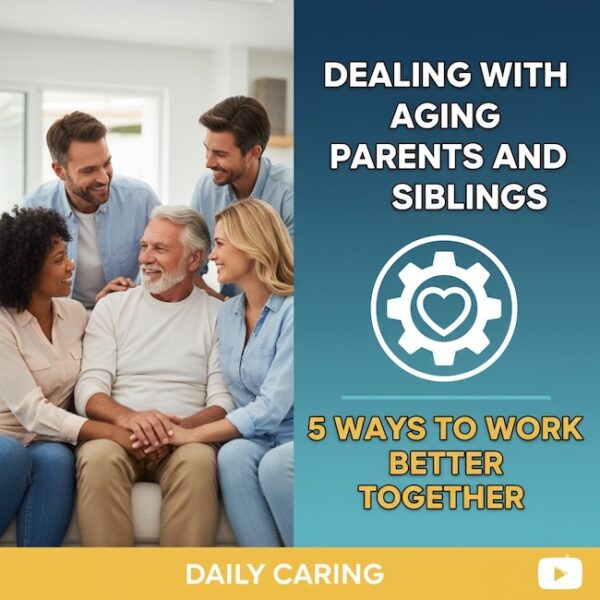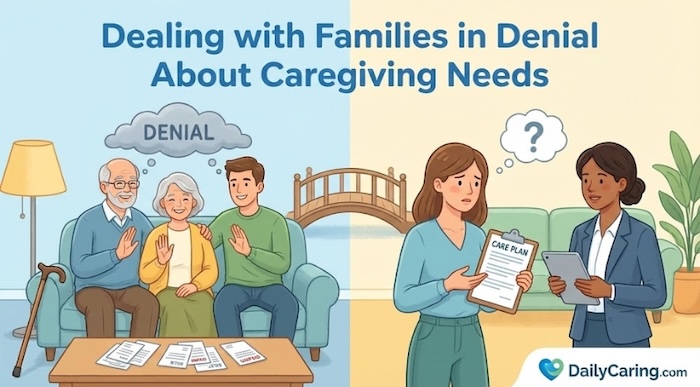Caring for an aging parent can be one of life’s most rewarding journeys, but it can also place immense strain on family relationships. When siblings are involved, old dynamics can resurface, and disagreements about care can create painful rifts. You are not alone in this challenge. Learning how to navigate these complex family dynamics is crucial for your parents’ well-being and your own.
By shifting from conflict to collaboration, you can turn this experience into an opportunity for connection. Here are five effective strategies to help you and your siblings work together as a unified team.

Caregiving With Family Members Can Bring Up Past Conflicts
For many caregivers, working with siblings to care for aging parents can be frustrating and stressful. Or, to work with family to care for a spouse or other relative.
There’s a lot to deal with – past conflicts, clashing personalities, tough decisions, and unequal contributions.
In a U.S. News & World Report article, Francine Russo shares tips from her book “They're Your Parents, Too! How Siblings Can Survive Their Parents' Aging Without Driving Each Other Crazy“.
Her advice is timeless and applies to other family relationships, not just siblings.
We share five valuable tips to help caregivers struggling to work with family to care for their older adult.
Top 5 Tips for Dealing with Aging Parents and Siblings
1. Falling prey to the misconception that “I shouldn't have to ask”
If you're the one doing most (or all) of the caregiving, you've probably thought: “If my sister were a good person, she would volunteer to help or at least be more willing to help.”
Francine’s advice is to remember that not all siblings feel the same way about their parents.
Each person has a unique relationship and a distinct role within the family as they grow up. Today, they may not feel the same way about your parents’ care as you do.
2. Assuming That Our Siblings Haven't Changed a Bit
Francine suggests approaching your relatives as adults because their reaction could surprise you.
After all, you’re no longer the same person you were in childhood. Before making any assumptions, give them a chance to show you their adult personality.
3. Automatically Reverting to Childhood Roles
Maybe when you were kids, the older sibling handled everything.
It’s easy to fall back into that pattern and let them take on most of the responsibility of caring for your parents.
Francine reminds us that it isn’t fair to any sibling. Take a step back, and don’t fall into those old roles without thinking it through and talking it through.
4. Not realizing that your parent, not your sibling, may cause your beef
“They may not mean to, but parents can divide their adult children,” says Russo.
Her example: You fly in to visit your mom, and all she can talk about is how your brother called her a few times last week and how wonderful he is. That will probably make you grind your teeth in frustration since you’ve just flown across the country to see her.
Parents can also divide their children when they tell each person a different story about how they’re doing.
The one who sees them most often or lives nearby might get the truth about her decline. But the one who’s far away may see mom putting on a good face because she doesn’t want them to worry.
When the two siblings talk, they’ll have completely different ideas about how their mother is doing, and each will think the other is unreasonable.
5. Not planning for brutal realities ahead
End-of-life is challenging to discuss, so most people avoid starting the conversation.
But avoiding it until the last minute can cause even more conflict and problems at the worst time.
Francine’s tip is to call a family meeting when your parents are still healthy.
Here’s her suggestion for how to start the conversation: “Remember, Aunt so-and-so, and how our cousins were still fighting when she was on the respirator, and they wouldn't let her die, and how painful that was for everybody? We don't want that to happen in our family. Mom, Dad, do you have a living will? Have you designated someone as your healthcare proxy? If you were on a respirator or in terrible shape, would you want us to do everything possible, or would you want to go quietly? Who should make that decision? We'll all want to do what's right, but we may have different feelings.”
When the whole family hears your parents’ wishes straight from their mouths, it’s easier to be on the same page when the time comes to carry out those wishes.
VIDEO: How Should Siblings Deal With Aging Parents?
Next Steps: Get Francine’s 9 caregiver tips for dealing with aging parents and siblings at U.S. News & World Report
Recommended for you:
- 3 Ways to Deal with Family in Denial About Seniors Needing Help
- 4 Tips to Get Siblings to Help Care for Aging Parents
- Elder Mediation Helps Siblings Resolve Conflicts and Care for Aging Parents
This article wasn't sponsored, but does contain affiliate links. We never link to products or services for the sole purpose of making a commission. For more information, see How We Make Money.
About the Author

Connie is the founder of DailyCaring.com and was a hands-on caregiver for her grandmother for 20 years. (Grandma made it to 101 years old!) She knows how challenging, overwhelming, and all-consuming caring for an older adult can be. She also understands the importance of support, especially in the form of practical solutions, valuable resources, and self-care tips.














what does one do when it is stepfamily and none are very understanding of a stepmom
We’ve got a number of articles about working with family that might be helpful:
– 4 Ways to Get Family to Help with Aging Parents https://dailycaring.com/4-tips-get-family-to-help-with-elderly-parents/
– Overcome 3 Excuses from Relatives Who Avoid Caregiving https://dailycaring.com/overcome-3-excuses-from-relatives-who-avoid-caregiving/
– Caregiver Family Meetings: 5 Keys to Success https://dailycaring.com/5-keys-to-successful-caregiver-family-meetings/
– 6 Ways to Improve the Situation When Siblings Don’t Help with Aging Parents https://dailycaring.com/6-ways-to-improve-the-situation-when-siblings-dont-help-with-aging-parents/
– Elder Mediation Helps Siblings Resolve Conflicts and Care for Aging Parents https://dailycaring.com/stop-arguing-with-siblings-about-moms-care-try-elder-mediation/
Sorry but this isn’t a “Reply,” but a cry for help too.
First, my sister lives in CA and I live nearby to our Mom in CT. I have always had a difficult relationship with my sister. She’s 3 years older than me and even as kids, we never had a loving/fun relationship. I was always scared of what she’d do next. Anyway, now that our Mom has progressed to needing to live in a Skilled Nursing Facility for Dementia/Alzheimer patients, my sister’s emails and texts are VERY hurtful, very critical, disrespectful, non-supportive of our efforts and never believes what my husband and I tell her about Mom. It goes on and on like that. For the last several years, for my health and to reduce my stress from “the sister,” my husband and I have banned/blocked my sister from calling us on the phone as we don’t have supportive conversations about Mom, instead my sister monopolizes the conversations with her agendas and doesn’t hear what we have to say. We never talk about anything else except things pertaining to Mom. So as our Mom has progressed through her disease, I not only lost my Mom to Advanced Dementia, but lost any hope of having a friendly and respectful relationship with my sister. And I get a lot of anxiety expecting my sister’s next set of emails/texts. I have seen a LCSW for years and stopped this spring 2019, and also attended a Support Group because of Mom. The support group ended a year ago as the facilitator moved away and no one else fills those shoes as well as the other facilitator. I’ve tried. But unfortunately the sister thing is really bad and upsetting more than care giving Mom. Other than suggesting I go back to seeing a LCSW and/or attending another support group, what else is there? Thanks!
So sorry that all of this is happening 🙁 Your plan to find a new support group and a new counselor or therapist is a good one. A trained counselor could help you find ways to cope with your sister.
In case it’s helpful, we’ve got some online caregiver support groups that might also be helpful — Support Groups for Caregivers on Facebook https://dailycaring.com/support-groups-for-caregivers-on-facebook/
We also have an article with some resources for counseling and therapy — 3 Sources of Affordable Counseling Services to Reduce Caregiver Stress https://dailycaring.com/low-cost-therapy-options-help-caregivers-cope/
I am the only relative living near my mom . When “mom” says something odd or when she doesn’t answer her phone I get the call to go check on her . It can be 3 or 4 calls a day from all family members. Dealing with her is a lot and their added burdens is driving me crazy.
This is an understanably frustrating situation. It’s possible that your family members don’t realize that other family members are also calling frequently and that it’s becoming such a burden on you. It may help to hold a family meeting so you can all share information, discuss the situation, and come up with a reasonable plan that won’t overburden you.
These articles may be helpful:
— 5 Essential Parts of Successful Caregiver Family Meetings https://dailycaring.com/5-keys-to-successful-caregiver-family-meetings/
— 4 Caregiving Tips for Getting Siblings to Help with Parents https://dailycaring.com/4-caregiving-tips-for-getting-siblings-to-help-with-parents/
— 3 Tips for Managing Caregiving with Siblings https://dailycaring.com/3-tips-for-managing-caregiving-with-siblings/
— 6 Ways to Improve the Situation When Siblings Don’t Help with Aging Parents https://dailycaring.com/6-ways-to-improve-the-situation-when-siblings-dont-help-with-aging-parents/